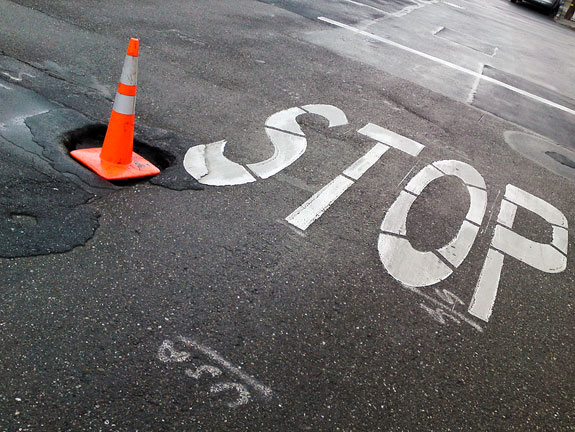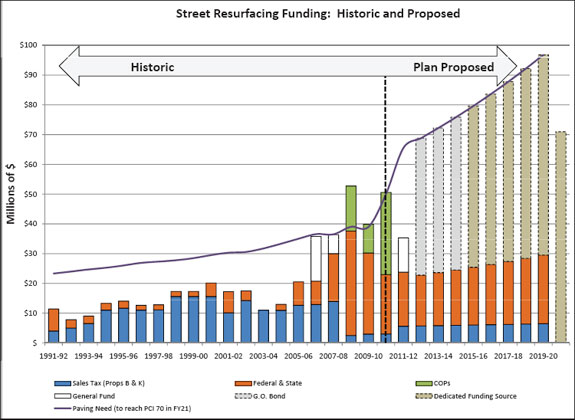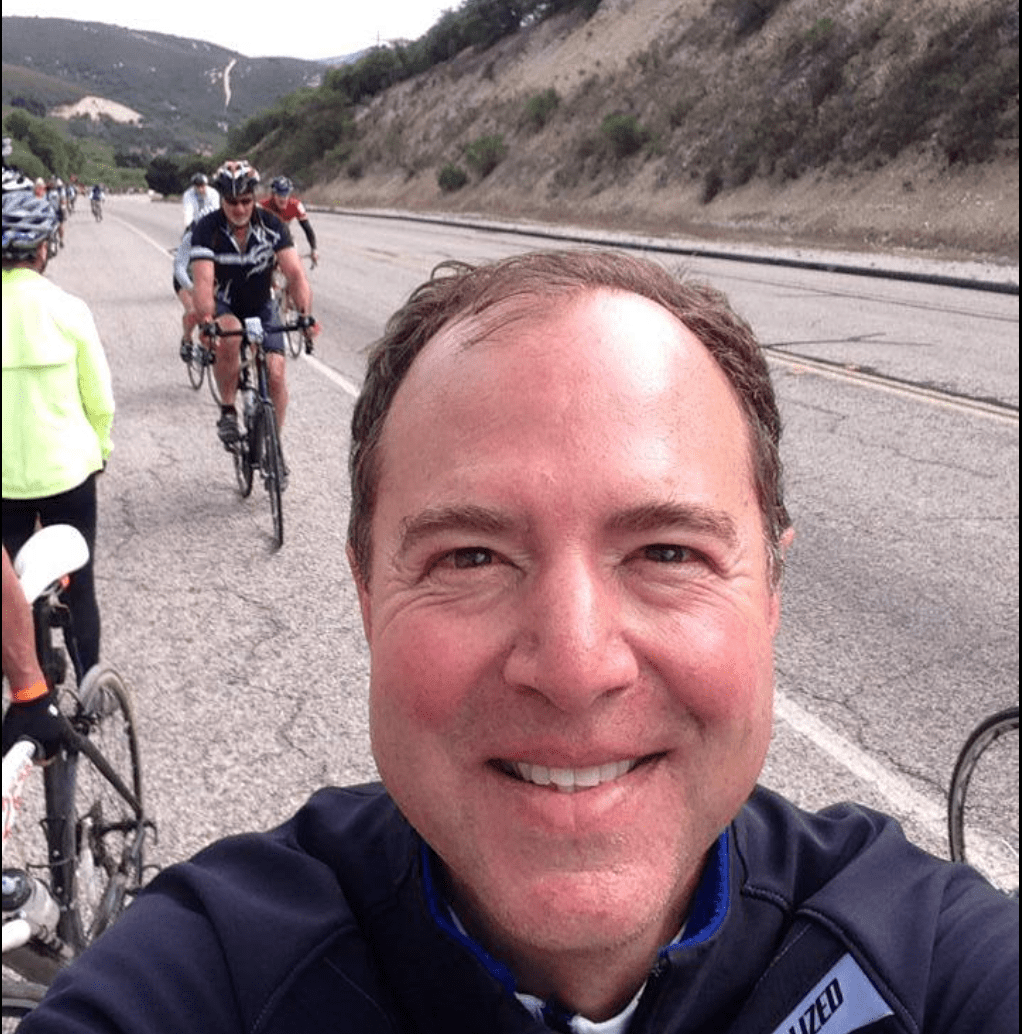Streets Bond Measure Headed to November Ballot
4:21 PM PDT on July 29, 2011
Editor's note: This is the first in a series of occasional stories on the "2011 Road Repaving and Street Safety Bond."
A $248 million streets bond measure being pushed by San Francisco Mayor Ed Lee and other electeds is on its way to the November ballot after being approved this week in a 9-2 vote by the Board of Supervisors. The "2011 Road Repaving and Street Safety Bond" would provide funds over three years to repave the city's crumbling streets and fix cracked and buckling sidewalks. Streets with high volumes of transit, bicycle and pedestrian traffic would be prioritized.
"With more than half of our 850 miles of roadways deteriorating, we must confront the crisis in the condition of our streets now or we will face even greater costs and threats to public health and safety later," Lee said in a statement released yesterday.
The San Francisco Department of Public Works (SFDPW) recently posted maps online that give a citywide breakdown of which streets stand to benefit from the bond money. The final list of streets would be "geographically equitable" and the SFDPW would "ensure that projects are evenly distributed to all parts of the city" without raising property taxes.
The agency's outgoing director, Ed Reiskin, recently appointed to head the San Francisco Municipal Transportation Agency, said funding sources to improve street conditions have gradually declined over the years, and the measure is urgently needed to rebuild a growing backlog of streets in poor condition.
"We have a huge need. That backlog is maybe three quarters of a billion dollars, and there's just no way that we can dig out of that hole using the operating dollars that are funding police and firefighters and library services and health and human services," Reiskin told Streetsblog in a recent interview.
The bond measure, which requires a two-thirds vote, would gear $148 million to street repaving and construction (a total of 1,389 street segments), $7.3 million to repair street structures such as bridges, retaining walls and stairways, $22 million for sidewalk repairs (including ADA-compliant curb ramps and repairing up to 75,000 square feet of damaged sidewalks), $50 million for pedestrian, bicycle and streetscape improvements, and $20.3 million for transit and pedestrian signal infrastructure improvements. It would also create about 1,600 jobs, according to the Mayor's Office.
SFDPW has not released a list of specific bicycle and pedestrian improvements but Reiskin said many of the remaining projects in the Bike Plan could be built and that the city's Pedestrian Safety Task Force was working actively to identify where the most pressing needs are. Supervisor Jane Kim, who supports the measure, has said that she would work to see that some of the money is directed to pedestrian improvements in District 6, which has the highest rate of pedestrian fatalities and injuries.
"The first thing this bond measure does is to start improving the average condition of the streets," Reiskin said. "The second thing that is important is bicycle facilities, whether it's striping or dedicated bike lanes. A lot more streets that serve bicycles will get done if this bond passes."
Although a similar measure was defeated in 2005 -- it failed to get two-thirds -- Reiskin pointed out that 56 percent of voters still said yes, without any kind of campaign. This time around, he expects a campaign and seems more confident it will pass. He added that many major cities use debt financing to resurface streets, including New York City, Chicago, Seattle, Minneapolis and Houston, among others.
"We're supporting it because the city needs money to fix our streets and make them safe to walk on, and this is one good revenue source among hopefully many that we can bring to this important goal," said Elizabeth Stampe, the executive director of Walk San Francisco. "The bicycle and pedestrian improvements are investments in long-term, permanent improvements in our city streets, and that is exactly what a bond is for."
"It's not only about the repaving but investing in better bicycle and pedestrian infrastructure that is above and beyond maintenance," said San Francisco Bicycle Coalition Executive Director Leah Shahum. "There's a lot of really important projects that are building momentum that this will give real legs to, just in the next three years. It could be a really big boost to great streets."
Some Transit Advocates Opposed
The vote to support the measure on the SFBC's board was 10-1, with Amandeep Jawa casting the lone dissent. In an email to Streetsblog, Jawa explained that he feels the measure is "irresponsible" and a "bad deal." He argues the lifetime of the debt could last longer than the repairs and construction.
"If we are to sign on to such a stop gap, it is only responsible to do so if it buys us time to fix the real problem. But this proposal has no such long-term solutions in it," Jawa wrote. "We are just signing on to 'borrow money and hope for a better tomorrow.' In effect, all we are doing by supporting this measure is kicking the can down the road so that in 10-15 years we will have the same crisis, but we will be in worse shape financially as a City."
Tom Radulovich, the executive director of Livable City, shares Jawa's concerns. Livable City is officially opposed to the measure, citing several reasons. For one, Radulovich is frustrated that SFDPW is not adhering to the city's livable streets policies when it repaves most streets because of a lack of funds.
"When they're rebuilding city streets, per city law, per the Complete Streets plan ordinance and the Better Streets ordinance, they're supposed to be using the major streets rehab to do pedestrian improvements, but they're failing to do that," Radulovich said. "I love fresh asphalt. I just want less blood on it."
Radulovich said the city shouldn't conceal the costs from motorists, and ought to consider a user fee -- such as congestion pricing, a gas tax, adjusting the price of residential parking -- to help fund street and parking maintenance.
"As a driver, you're not going to pay anymore to drive, but as a non-driver I'm going to pay more for automobile infrastructure. We're sending the wrong economical signals by continually hiding the trust cost of motoring from drivers," Radulovich said.
Supervisor Sean Elsbernd, who voted against the measure along with his colleague Mark Farrell, was also concerned there isn't a long-term funding component "to ensure that 10 years from now we don't have another backlog. That's my frustration."
"I agree with Tom that there is a cost associated with driving a car, owning a car and the impact that those cars have on our streets. Absolutely. I get that," Elsbernd told Streetsblog, adding that he would support "some new fee or some new tax," such as a hike in the vehicle license fee, to pay for street resurfacing.
A bill by State Senator Mark Leno would allow San Francisco to restore the vehicle license fee to previous levels, which he said could generate up to $44 million annually "to help restore and preserve essential programs." The legislation, SB223, passed the upper house last month and is scheduled for a hearing before the Assembly Appropriations Committee August 17, said a spokesperson for Leno.
Supporters Say Short-Term Funds Needed
Supporters of the measure agree there needs to be a long-term funding solution, but argue that until there's a consensus SFDPW cannot let the city's backlog get worse.
"The fact that the cost of repairing a street gets exponentially more expensive over time means that rather than spending four dollars down the road we can spend a dollar now and save money in the long-term even if we're borrowing to get that dollar. It's still cheaper in the long-term," said Reiskin.
"The streets are in such bad shape that even if this not long-term we need to do it," said Bob Planthold, the chair of California Walks who is also the pedestrian coordinator for the Senior Action Network (SAN). "Otherwise, things get worse and the city assumes a great financial liability for injuries caused by broken jumbled pavement so that neglect, inactivity means greater litigation and damage costs that the city will incur in the future."
Although Planthold supports the measure, SAN has not taken an official position on it. He said he planned to encourage SAN's board to support it.
"We have been negligent, you know, for about 30 years and have systematically underfunded our roads and the chickens are coming home to roost," said Supervisor Scott Wiener. "This bond will allow us, for three years, to really do what we need to do on our roads and start bearing the backlog and that gives a three-year period to establish a sustainable funding stream."
Next: We'll take a look at some of the long-term funding solutions that have emerged to pay for street maintenance and repaving, and the political realities of implementing them.
Stay in touch
Sign up for our free newsletter





